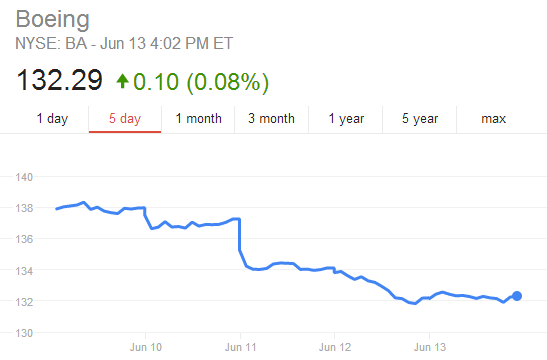
It's both easy and tempting to over-interpret Rep. Eric Cantor's historical primary loss.
I'm not a political pundit, but surely one of the main lessons was the very prosaic: "don't neglect your district."
Beyond that, one interesting issue to come out of Cantor's totally unexpected defeat is the feasibility -- or lack thereof -- of the delicate dance the majority leader tried to do: snuggle up real close to business and especially, in Cantor's case, financial markets on the one hand, and claim far right street cred on the other.
One striking thing I failed to notice in this regard -- though it was reported -- is in the figure below. I've been critical of equity markets in recent years in terms of their "efficient capital allocation" function (versus their bubble machine function), but they do quickly process information. The big dip in figure shows Boeing's stock price reaction once Cantor's loss became known.

The winner of the Virginia primary, Dave Brat, attacked Cantor for practicing crony capitalism: using government policy to provide breaks and deals for favored industries and firms, like Boeing, which, as I'll discuss in a moment, has a long and dependent relationship with the Export-Import Bank (XMB), a government-sponsored credit provider.
Surely, one way to view that June 11 negative spike in Boeing's share price is as a quantification of the validity of Brat's attack.
It is in this regard that many commentators have made the case that at least when it comes to government largess towards corporate America, Brat may have more in common with populist Democrats than many Republicans. (Though let's see how Brat plays this stuff if he makes it to the House -- it's easier in theory than in practice, especially for a newcomer.)
The question I'd like to tackle here -- briefly, as at this point I'm just procrastinating on Sunday chores -- is why Boeing and what might this mean for government's role in the economy?
The reason Boeing's stock tanked on Cantor's loss is all about the political viability of the Export-Import Bank. One of the bank's key functions is to provide a government backstop in the form of loan guarantees to loans procured by other countries when they buy our exports. When Indonesia decides to buy $20 billion in jetliners from Boeing, no private bank will undertake that credit risk without adding a phat risk premium to the loan. The XMB exists to obviate that deal-threatening extra charge and thus facilitate the loan, the sales, and the domestic production and jobs that follow.
As the New York Times noted today: "Stock analysts said Boeing expected the bank to enable $10 billion in sales this year by helping its customers finance purchases. Mr. Cantor's loss jeopardized the future of the bank."
Though it's been quietly doing its thing since the 1930s, the XMB is under attack by populist Republicans who want to sever any connections between the public and private sectors by denying the bank reauthorization in September. Last time I wrote about this, I stressed that there are "market failures and risks in play here that private investors cannot adequately offset. For one, Europe has its own consortium supporting aircraft manufacturing, Airbus, and those who oppose XM financing here have to be able to explain why it's OK to unilaterally disarm." In fact, something like 60 countries have credit subsidy agencies to help boost exports.
So, does that make any supporter of the XMB a crony capitalist? Not to my thinking. I'd say instead that the XMB is a reminder of many nuanced realities that our current foolish and divisive politics completely ignores:
-- There are innumerable ways in which public and private sectors interact, as with the XMB, in advanced economies across the globe. To inveigh against all of them without evaluating the legitimacy of their role in offsetting "missing markets" is economically lazy, short-sighted, and destructive (on the other hand, here's Joe Nocera, who clearly loves him some XMB!).
-- That said, the Brat's of the world [sic] have a point in that for politicians to pretend otherwise, invoking red-meat slogans like "free trade," "the government doesn't create jobs," "the government doesn't pick winners," and then support institutions like the XMB is nonsensical.
-- The XMB needs to diversify, especially re Boeing. For a large, private manufacturer to depend so deeply on government loan guarantees is dangerous and potentially unstable. Imagine the upheaval to communities where Boeing is such a strong presence if the hard right shuts down the bank.
OK, I'm out... apparently that grill over there isn't going to clean itself.
This post originally appeared at Jared Bernstein's On The Economy blog.
